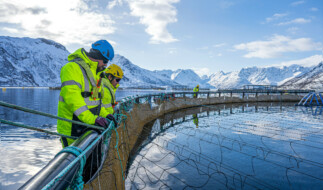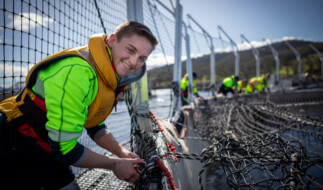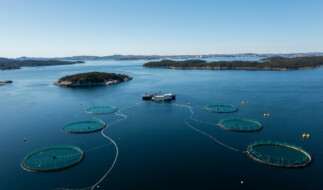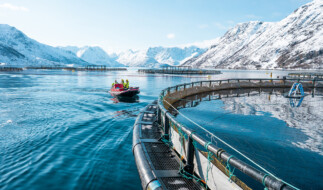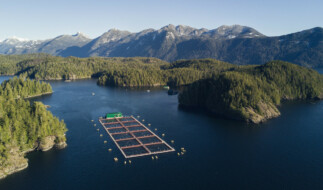GSI's change model is a unique and successful model where companies come together to share knowledge and expertise to catalyze improvements in the environmental and social performance of an entire sector.
Global Salmon Initiative Change Model
Aquaculture is one of the fastest growing food-producing sectors on the planet. While farmed fish is widely recognized as a healthy and eco-efficient protein, it must be managed responsibly as the industry grows to ensure it remains a sustainable option. We believe that collaboration is the only way to ensure continuous improvements and are committed to working together to ensure responsible and sustainable food systems for the future.
The world faces many risks in the coming decade; business as usual is no longer an option. Our food systems are under threat from a changing climate and need drastic transformation. Working independently or on a smaller scale may address some challenges, but it will not deliver significant change or address the challenges at the speed or scale our food systems require. Which is where GSI comes in, through members' commitment to collaboration, transparency and innovation, we work together, learn from each other, and strengthen our ability to adapt and build resiliency.
GSI is the leading example of industry leadership in transforming an entire sector towards a more sustainable future.Jason Clay, Senior Vice President, Markets Institute, World Wildlife Fund
Within GSI, we have identified key areas - our action pillars - where we can have a greater impact by working together at a greater scale and faster rate than working individually. This includes:
- Climate action
- Reducing carbon footprint
- Strengthening climate resiliency
- Respect for nature
- Improving fish health and welfare
- Supporting biodiversity, including improving sustainable sourcing of feed ingredients
- Contributions to sustainable food systems
- Ensuring greater transparency and social responsibility
- Contributing to local communities
- Working towards ASC certification
- Maintaining the health and nutrition benefits provided by farmed salmon
Collaboration is essential for sustainable climate action. By working with GSI I get to see the realities about salmon farms rather than just my computer trying to work it out for myself, and we can learn from each other to adapt much quicker.Dr. Lynne Falconer, UKRI Future Leaders Fellow at the University of Stirling
Benefits of collaboration
At GSI we talk a lot about accelerating sustainability improvements at speed and scale, but how does our change model actually help do this?
Within GSI, we rely on collaboration to advance sustainability goals and provide a framework to deliver measurable progress. We achieve this by uniting the knowledge and resources of our member companies along with external experts. Together, we address shared sustainability challenges, including the sourcing of feed ingredients, disease risk management, and addressing the impacts of climate change. Additionally, we provide a platform to share and learn from best-practices to strengthen the sector’s resiliency for the future.
By working together on shared environmental challenges, we are able to:
- Set ambitious sustainability goals and develop pathways to help us meet them
- Pool expertise and perspectives
- Promote knowledge exchange
- Accelerate the speed of innovation
- Support greater adoption of best-practices
- Work with external partners in a coordinated, industry-wide approach
Together we are breaking down sustainability risks and challenges we face and are finding solutions that help pave the way to a more sustainable future at the speed the world needs.
Ability to replicate model
What makes the GSI model so interesting is that it is not unique to salmon farming or aquaculture only. There are many opportunities and learnings from our work over the last decade, which could help other sectors accelerate sustainability transformations, too.
One way we are working to share our experiences from collaborative efforts is in partnership with the Gates Foundation, by helping in the mission to support an evolving sustainable aquaculture sector in Africa.
Looking to the future
Over the last ten years, GSI’s change model has shown measurable progress in improving the sustainability of the global salmon farming sector and supply chain. However, we are not done, and there is still a lot to work on to ensure the future sustainability of the sector. We are committed to the significant improvement in the sustainability and transparency of the global salmon farming sector, and using collaboration to drive action towards ambitious sustainability goals and provide the framework to deliver measurable progress.
